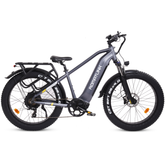What are the drawbacks of riding an electric bicycle?
Are Electric Bicycles Really Worth It?
Electric bicycles, also known as e-bikes, have gained popularity in recent years as a convenient and eco-friendly mode of transportation. With their electric motors providing assistance to riders, e-bikes offer an easier and faster way to commute or explore the outdoors. However, like any other form of transportation, electric bicycles also come with their drawbacks that riders should be aware of.
1. Limited Range and Battery Life
One of the main drawbacks of riding an electric bicycle is its limited range and battery life. While e-bikes can cover significant distances, they are still dependent on battery power. Once the battery runs out, the rider will need to rely solely on pedaling, which can be tiring, especially on uphill terrains. Additionally, recharging the battery can take several hours, limiting the usability of the e-bike for longer trips.
2. Higher Initial Cost
Compared to traditional bicycles, electric bicycles tend to have a higher upfront cost. The inclusion of an electric motor, battery, and other components increases the manufacturing and production expenses, resulting in a higher price tag for consumers. This can be a significant drawback for individuals on a tight budget or those who are not yet fully convinced of the benefits of e-bikes.
3. Heavier and Bulkier
Due to the additional components, electric bicycles are generally heavier and bulkier than regular bicycles. The weight of the motor and battery can make it more challenging to maneuver and handle the e-bike, especially when navigating tight spaces or carrying it up stairs. This can be a disadvantage for individuals who need to transport their bicycles frequently or have limited storage space.
4. Maintenance and Repairs
Electric bicycles require regular maintenance and occasional repairs, just like any other vehicle. The electrical components, such as the motor and battery, may need servicing or replacement over time, adding to the overall cost of ownership. Finding specialized technicians or bike shops that can handle e-bike repairs might also be more challenging compared to traditional bicycle repairs.
5. Regulatory Restrictions
Depending on the jurisdiction, electric bicycles may be subject to specific regulations and restrictions. Some areas have speed limits for e-bikes, require riders to have a license or registration, or restrict their usage on certain paths or trails. It is essential for riders to familiarize themselves with the local laws and regulations regarding electric bicycles to avoid any legal issues or penalties.
Conclusion
While electric bicycles offer numerous benefits, such as assisted pedaling and eco-friendly transportation, they also have their drawbacks. Limited range and battery life, higher initial cost, increased weight, maintenance requirements, and regulatory restrictions are factors that potential e-bike riders should consider. Understanding these drawbacks can help individuals make an informed decision and determine if an electric bicycle is the right choice for their needs and circumstances.




